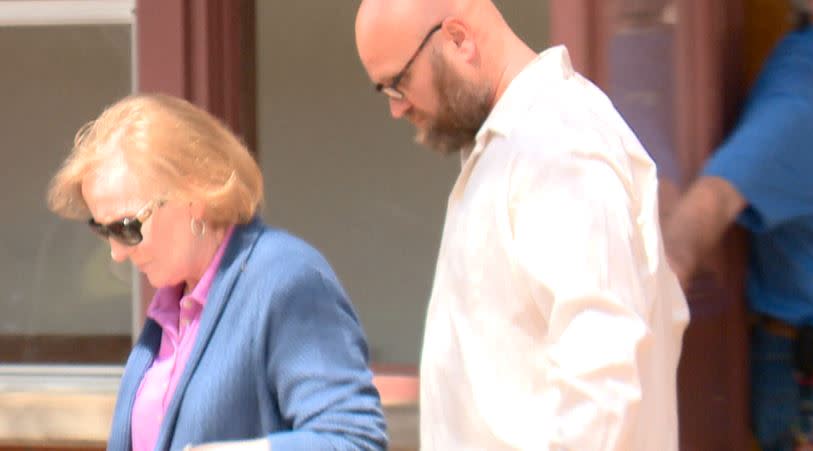Pending proceedings could reshape Rodney Reed death row case

AUSTIN (KXAN) – Pending proceedings in the case of Rodney Reed – including a petition before the U.S. Supreme Court and a lawsuit to open a pathway to DNA testing of crime scene evidence – could reshape the death row inmate’s longstanding murder case.
A Bastrop court convicted Reed of sexually assaulting and killing 19-year-old Stacey Stites and discarding her body beside a rural road in 1996. Investigators didn’t arrest a suspect until Reed’s DNA matched a sample from inside Stites. The state’s case hinged largely on that forensic evidence and the fact that Reed and Stites were strangers.

Over many years, Reed’s defense slowly uncovered new evidence, they say, was absent at trial and undermines the state’s original case. The post-trial evidence includes witnesses who testified they knew of a romantic relationship between Stites and Reed, and forensic experts who poked holes in the science used to determine the time and nature of the attack, according to motions and petitions filed by Reed over the years.
Murder in the Lost Pines – The Rodney Reed case
Reed has maintained his innocence and alleges the state withheld exculpatory, or favorable, evidence and relied on false evidence to prove its case, according to court filings.
Battle over evidence
On Dec. 22, Reed’s defense team filed a motion in the U.S. Western District of Texas arguing vital evidence was suppressed at trial, the state relied on false evidence and the court should reopen Reed’s habeas corpus proceedings that were denied in 2012, according to the motion filed under rule 60, which allows for relief from a final judgment if there was a fraud on the court.
Reed’s attorneys argue there was a fraud on the court, and they point to witness summaries the state disclosed in June 2021, decades after his trial. The summaries related to three of Stites’ friends and coworkers who told law enforcement before Reed’s original trial that the two knew each other, according to Reed’s motion.
EXPLORE: Full coverage of the Rodney Reed case
“While knowing the opposite was true, prosecutors repeatedly told the jury that Mr. Reed and Ms. Stites were strangers and that she, a white woman, would never have associated with him, a Black man,” said Jane Pucher, a senior staff attorney with the Innocence Project representing Reed. “At Mr. Reed’s 1998 trial, prosecutors illegally concealed statements from Ms. Stites’s co-workers showing that Mr. Reed and Ms. Stites knew each other and were romantically involved.”
A writ of habeas corpus is a term to describe a process a defendant can use to ask the court to determine if their imprisonment is lawful, and it can be used to litigate new evidence.
Back in 2021, state prosecutors told a Bastrop judge they disclosed the witness summaries “out of an abundance of caution” and “far exceeded their legal and ethical duties” in doing so. Furthermore, information provided by the witnesses centered on “rumors,” which a Brady claim could not be based on, one prosecutor said at the time. The Brady doctrine requires the prosecution to turn over all exculpatory evidence to the defense.
The witness summaries surfaced days ahead of a two-week evidentiary hearing in Bastrop in which 47 witnesses testified, according to court records. Those witnesses included Stites’ fiancé at the time of her death, Jimmy Fennell. Reed’s defense has tried to paint Fennell as the true killer. At the hearing, Fennell waived his right to any attorney, testified and, under questioning by Reed’s attorney, denied killing Stites.

In January, state prosecutors filed their response in federal court, saying the court should dismiss Reed’s latest motion. They described it as a “successive petition in disguise” that doesn’t show “fraud” or “exceptional circumstances,” and over which the court lacks jurisdiction, according to the state’s response filed in January.
Reed also has pending litigation in the U.S. Fifth Circuit Court of Appeals related to his quest for DNA testing of crime scene evidence.
The quest for DNA testing
The pending litigation in the Fifth Circuit is rooted in a 2014 motion Reed filed in a Texas trial court seeking DNA testing of evidence. That motion was denied, in part because of problems with the preservation of the evidence.
Reed filed a lawsuit in federal court arguing Texas’ laws for chain-of-custody requirements were unconstitutional.
“Reed remains on death row, and District Attorney Bryan Goertz still refuses to let him DNA test critical crime-scene evidence, including the belt used to strangle Stites. Goertz has kept the evidence locked away even though — or perhaps because — ‘DNA testing has an unparalleled ability … to exonerate the wrongly convicted,’” Reed states in a supplemental brief to the Fifth Circuit, filed in July 2023.
The lawsuit was dismissed in federal district court for not being timely, which the Fifth Circuit upheld. Reed appealed that dismissal to the U.S. Supreme Court, which granted relief in April 2023 and sent the case back to the Fifth Circuit.
Reed says the “appeal presents important questions of constitutional law in a capital case in which this Court and the Supreme Court have invested considerable judicial resources,” according to a supplemental brief.
Texas Court of Criminal Appeals rejects Rodney Reed’s innocence claims and new trial
In response, prosecutors say the Fifth Circuit should uphold the lower court’s dismissal of Reed’s lawsuit for DNA testing. Reed essentially argues “any State that provides any form of postconviction DNA testing must provide it without limit,” but the Supreme Court has rejected that “disguised substantive” due process argument, according to the state’s supplemental brief filed September 2023.
Reed has asked the Fifth Circuit to grant oral arguments on the case.
As Reed’s litigation in the Fifth Circuit is considered, the U.S. Supreme Court is weighing another petition.
Rubberstamped?
Reed filed a petition for writ of certiorari before the Supreme Court on Nov. 22, 2023, asking the court to review whether his due process rights were violated in state court.
Reed argues the trial judge from the 2021 evidentiary hearing failed to act as an unbiased factfinder and rubberstamped the state’s proposed findings of fact and conclusions. The Texas Court of Criminal Appeals later adopted the findings, which “credited all of the state’s witnesses and discredited all of Reed’s,” according to the petition.
Reed also argues the Court of Criminal Appeals distorted the standard for his innocence claim by raising the bar beyond new evidence that would “likely give a reasonable juror a reasonable doubt” to evidence that “affirmatively proves a petitioner’s innocence,” according to the petition. Only the Texas Court of Criminal Appeals and the Missouri Supreme Court require that higher standard of proof, Reed states.
The state has asked for an extension of time to submit its response to Reed’s Supreme Court petition.
It is not clear when the Supreme Court and other courts will make their decisions on Reed’s filings.
Texas has twice set an execution date for Reed, with the last one set on Nov. 20, 2019. Both of those executions were stayed, and it is not clear if or when a new date may be set.
For the latest news, weather, sports, and streaming video, head to KXAN Austin.

